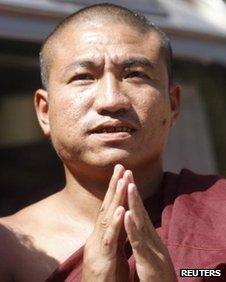Burmese protest leader monk Gambira 'taken away'
- Published

Shin Gambira, one of the leaders of the All-Burmese Monks Alliance
The Burmese monk Shin Gambira has been taken away by the authorities, sources told the BBC's Burmese service.
Gambira, jailed for his role in leading the 2007 anti-government protests, was released last month by the country's civilian, military-backed government.
He was taken from a monastery in Rangoon early Friday morning, his brother said.
He was reportedly being questioned for ''breaching regulations'' an official told Agence France-Presse.
Some 15 officials came in three cars at about 01:15 local time (1845 GMT Thursday), a monk who was with Gambira told the BBC.
These officials were from the government religious authority department and Rangoon division government, he added.
After he was freed last month, Gambira has reportedly been reopening monasteries that were locked up by the authorities since the ''saffron revolution'' movement led by monks in 2007.
"He was taken this morning from his monastery for questioning because he broke the locks of three monasteries since his release," the official who wished to remain anonymous told AFP.
'Sensitive time'
In interviews following his release, he has expressed deep scepticism about reforms taking place in Burma, says the BBC's South East Asia correspondent Rachel Harvey.
One of the leaders of the All-Burmese Monks Alliance, the 31-year-old was arrested on 4 November, 2007, weeks after the protest was crushed.
Less than three weeks later, he was jailed for 68 years, including 12 of hard labour.
He was one of 651 people freed on 13 January in what was the most significant release of political prisoners since the country began a series of reforms aimed at encouraging the lifting of sanctions imposed by the European Union and United States.
The detention of such a high profile figure comes at a sensitive time, just as official campaigning for forthcoming by-elections gets underway, says our correspondent.
Campaigning begins today in all constituencies being contested in the 1 April poll, which will be watched closely by the EU, US, UN and human rights activists.
An EU official is due to visit Burma on Saturday to offer 150m euros ($199m, £126m) in aid following the series of recent reforms.
Andris Piebalgs, the European Union development commissioner, will meet with President Thein Sein as well as pro-democracy opposition leader Aung San Suu Kyi, who is contesting in the upcoming by-elections.
Meanwhile, the US has eased one of the sanctions it levels against Burma, in what it said was a response to ongoing reforms.
The partial waiver, signed on Monday, will allow Burma to receive limited technical assistance from international financial institutions.
- Published13 January 2012
- Published15 November 2012
- Published24 January 2012